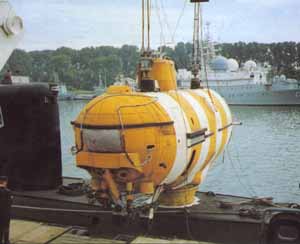
The system built to manage Russia’s nuclear legacy is crumbling, our new report shows
Our op-ed originally appeared in The Moscow Times. For more than three decades, Russia has been burdened with the remains of the Soviet ...
News

Publish date: August 15, 2000
Written by: Thomas Nilsen
News
This photo shows one of Russia’s mini-submarines, purposely built to rescue crews out of sunken submarines. As shown in the photo, the mini-submarine is docked to an emergency exit hatch at a submarine. The rescue party in the area of accident will attempt to perform the same operation on the Kursk submarine at the bottom of the Barents Sea. The first attempt to dock to the hatch was not successful, but the rescue team is continuing their attempt and will hopefully manage to save the 116 crewmembers trapped in the sunken boat.
Russia has reportedly asked NATO for assistance in the rescue operation and late Tuesday night, a Scottish vessel carrying another mini-submarine for rescue operations from sunken submarines, is on its way to the north. But this vessel will need more than 40 hours to reach the Barents Sea, arriving at the earliest on Thursday afternoon.
ARS is a Russian abbreviation for “autonomous working capsule”, designed by Lazurit-bureau in St. Petersburg. It is supposed to have a crew of three and can possibly carry 15-20 persons each time. So, for the entire crew of Kursk, the operation has to be repeated 6 times. The ARS mini-submarine is 13.6 meters long and self-propelled. The batteries give the sub an operational time of 48 hours before they have to be recharged.

Our op-ed originally appeared in The Moscow Times. For more than three decades, Russia has been burdened with the remains of the Soviet ...

The United Nation’s COP30 global climate negotiations in Belém, Brazil ended this weekend with a watered-down resolution that failed to halt deforest...

For more than a week now — beginning September 23 — the Zaporizhzhia Nuclear Power Plant (ZNPP) has remained disconnected from Ukraine’s national pow...

Bellona has taken part in preparing the The World Nuclear Industry Status Report 2025 and will participate in the report’s global launch in Rome on September 22nd.